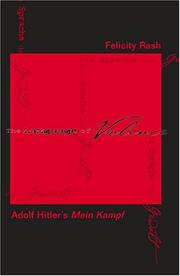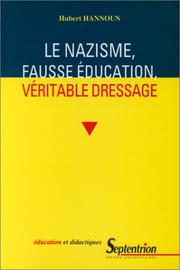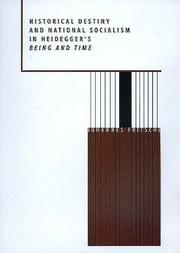| Listing 1 - 4 of 4 |
Sort by
|
Book
Year: 2011 Publisher: De Gruyter
Abstract | Keywords | Export | Availability | Bookmark
 Loading...
Loading...Choose an application
- Reference Manager
- EndNote
- RefWorks (Direct export to RefWorks)
Das Buch "Mein Kampf" ist wie keine andere Schrift zu einem Symbol des Nationalsozialismus und der nationalsozialistischen Herrschaft geworden. Gleichzeitig hält sich bis in die Gegenwart hartnäckig die Fehleinschätzung vom ungelesenen und unbeachteten "Bestseller". Die Ergebnisse von Othmar Plöckingers Studie stellen derartige Klischees über "Mein Kampf" in Frage. Plöckinger zeichnet die komplexe Entstehungsgeschichte des Buches nach, die keineswegs von Willkür geprägt war; er entfaltet die weit verzweigte Publikationsgeschichte und verfolgt das schwer zu überblickende Nach- und Nebeneinander der verschiedenen Ausgaben und Auflagen. Sehr deutlich analysiert er schließlich die intensive Auseinandersetzung mit dem Buch in Deutschland vor und nach 1933 und in den Staaten der späteren Alliierten.
Drittes Reich. --- Hitler, Adolf. --- Mein Kampf. --- Nationalsozialismus. --- Hitler, Adolf,

ISBN: 0820488070 0820481874 9780820481876 9780820488073 Year: 2006 Publisher: New York, N.Y. Lang
Abstract | Keywords | Export | Availability | Bookmark
 Loading...
Loading...Choose an application
- Reference Manager
- EndNote
- RefWorks (Direct export to RefWorks)
This unique linguistic analysis of Adolf Hitler's Mein Kampf examines how Hitler constructed Feindbilder (images of the enemy) and, in contrast, glorified the so-called Aryan race using a variety of lexical and rhetorical resources. Hitler's anti-Semitic imagery is analyzed in detail using the modern cognitive theory of metaphor associated with George Lakoff and Mark Turner. This book, which includes English translations for all quotations from Hitler's German text, reveals how anti-Semitic discourse may act as a paradigm for all racist and totalitarian propaganda. It will appeal to linguistics scholars and those in other fields - particulary historians and political theorists.
German language --- Pragmatics --- Hitler, Adolf --- Violence in literature --- Nazis --- Ideology --- Language and languages --- Language --- History --- Political aspects --- Rhetoric --- Hitler, Adolf, --- Criticism, Textual --- Violence in literature. --- Foreign languages --- Languages --- Anthropology --- Communication --- Ethnology --- Information theory --- Meaning (Psychology) --- Philology --- Linguistics --- Knowledge, Theory of --- Philosophy --- Political science --- Psychology --- Thought and thinking --- National socialists --- Fascists --- Socialists --- National socialism --- Neo-Nazis --- Language. --- Rhetoric. --- Gitler, Adolʹf, --- Hsi-tʻe-le, --- Hitlar, ʼAdolf, --- Chitler, Adolphos, --- Hitler, Adolph, --- Khitler, Adolf, --- Hitlerus, Adolfus, --- Hiṭlar, Aṭālpu, --- היטלר --- היטלר, אדולף, --- Criticism, Textual. --- Nazis - Language --- Ideology - Germany - History - 20th century --- Language and languages - Political aspects - Germany --- German language - Rhetoric --- Hitler, Adolf, - 1889-1945. - Mein Kampf - Criticism, Textual --- Hitler, Adolf, - 1889-1945 - Language --- Hitler, Adolf, - 1889-1945. - Mein Kampf --- Hitler, Adolf, - 1889-1945

ISBN: 285939530X 9782859395308 2757421867 Year: 1997 Volume: *2 Publisher: Villeneuve d'Ascq Presses universitaires du Septentrion
Abstract | Keywords | Export | Availability | Bookmark
 Loading...
Loading...Choose an application
- Reference Manager
- EndNote
- RefWorks (Direct export to RefWorks)
Un officier nazi fracasse la tête d’un nouveau-né contre un mur, un soldat SS ricane devant le spectacle de la déchéance du vieillard pour l’obtention d’un morceau de pain ; ce sont là des faits désormais connus du cauchemar hitlérien. Mais, ces images interrogent : cet officier, ce soldat ont été, un temps, des bébés graciles et merveilleux comme tous les bébés du monde, des écoliers à la sympathique turbulence, des adolescents qui ont frémi au premier « Je t’aime »... Qu’est-ce qui a fait de ces ex-bébés, ex-écoliers et ex-adolescents les monstres que l’on sait ? Parmi tous les facteurs qui peuvent expliquer ces transformations, Hubert Hannoun se penche sur celui de l’éducation. Quelle éducation peut fabriquer un monstre ? Question qui en porte une seconde : l’expression d’éducation nazie n’est-elle pas contradictoire si éduquer c’est élever, dans tous les sens de ce terme ? Pour y répondre, Hubert Hannoun analyse de très nombreux textes d’idéologues pré-nazis et nazis. S’il étudie plus spécialement le Mein Kampf d’Adolf Hitler, il se réfère, de plus, à tous les auteurs qui, avant lui, l’ont annoncé ou, à son époque, soutenu. Parmi les auteurs français, il rappelle les idées de M. Barrés, de Bonald, A. Carrel, P. Drieu La Rochelle, J.-A. Gobineau, G. Le Bon, J. de Maistre, Ch. Mourras, G. Vacher de la Pouge ; parmi les auteurs allemands, il cite E.-M. Arndt, H.-S. Chamberlain, J.-G. Fichte, M. Heidegger, J.-G. Herder, E. Krieck, P.-A. Lagarde (Botticher), F.-W. Nietzsche, A. Rosenberg. Son constat, après analyse, est double : - Il n’est aucune affirmation des théoriciens de l’éducation nazie de l’époque hitlérienne qui n’ait été déjà formulée par d’autres idéologues -— français ou allemand — des siècles précédents. En ce sens, l’apport de l’ère hitlérienne en la matière est nul. - L’édifice théorique nazi ne comporte aucune contradiction interne mais se fonde dans sa totalité sur trois principes infondés voire en contradiction avec les données de l’expérience.…
Education and national socialism --- Enseignement et national-socialisme --- Enseignement national-socialiste --- Enseignement nazi --- Nationaal-socialisme en onderwijs --- Nationaal-socialistisch onderwijs --- National socialism and education --- National socialist education --- National-socialisme et enseignement --- Nazi education --- Nazi-onderwijs --- Onderwijs en nationaal-socialisme --- Education --- Higher education and state --- Nazisme et éducation --- Enseignement supérieur --- History --- Political aspects --- Histoire --- Politique gouvernementale --- Aspect politique --- History. --- Nazisme et éducation --- Enseignement supérieur --- éducation --- enfant --- propagande --- fascisme --- nazisme --- élève --- endoctrinement --- dressage --- Hitler, Adolf (1889-1945). Mein Kampf --- Éducation --- National-socialisme --- Idéologie --- National-socialisme et éducation --- Philosophie --- Allemagne --- 1900-1945

ISBN: 0520919599 0585081522 9780520919594 9780585081526 9780520210028 0520210026 0520210026 Year: 1999 Publisher: Berkeley University of California press
Abstract | Keywords | Export | Availability | Bookmark
 Loading...
Loading...Choose an application
- Reference Manager
- EndNote
- RefWorks (Direct export to RefWorks)
There has been much debate over the relationship of Heidegger's philosophy--in particular his book Being and Time--to his practical involvement with National Socialism. Yet the question has never been addressed through a comparison of Being and Time with other texts on history and politics written at the time. Johannes Fritsche does this, providing a detailed interpretation of the relevant passages in Being and Time--especially sections 72-77 on fate, community, and society. He analyzes for comparison two other authors who explicitly regarded themselves as rightists--Adolf Hitler (Mein Kampf) and Max Scheler (Formalism in Ethics and other writings)--and two authors on the left--Georg Lukács (History and Class Consciousness) and Paul Tillich (The Socialist Decision). Fritsche concludes that Being and Time is a brilliant summary of right-wing politics in general, which proposes the destruction of liberal society in order to regenerate an idealized community. In addition, Heidegger rejects positions on the right, such as Scheler's, that enabled their authors to distance themselves from the most extreme political rightists, and thus he paves the way for National Socialism. Being and Time, Fritsche demonstrates, must be seen as a clear case for the National Socialists and their project of revitalization of the Volksgemeinschaft, the community of the people.
National socialism and philosophy. --- National socialism and philosophy --- Philosophy & Religion --- Philosophy --- Heidegger, Martin, --- Philosophy and national socialism --- adolf hitler. --- being and time. --- community. --- existentialism. --- fate. --- formalism in ethics. --- georg lukacs. --- german philosophy. --- heidegger. --- history and class consciousness. --- history and politics. --- idealized community. --- left wing politics. --- leftist politics. --- liberal society. --- martin heidegger. --- max scheler. --- meaning of being. --- mein kampf. --- metaphysics. --- national socialism. --- paul tillich. --- phenomenology. --- philosophy. --- political philosophy. --- politics. --- right wing politics. --- rightist politics. --- socialism. --- society. --- the socialist decision. --- volksgemeinschaft. --- National-socialisme --- Fascisme --- National-socialisme et philosophie --- Allemagne --- 1933-1945
| Listing 1 - 4 of 4 |
Sort by
|

 Search
Search Feedback
Feedback About UniCat
About UniCat  Help
Help News
News